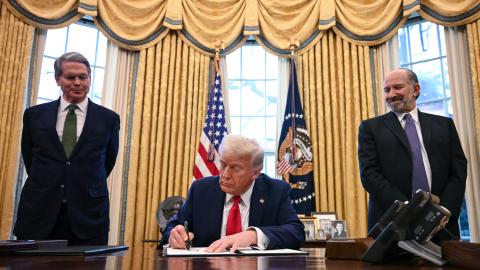All is quiet on the Washington front. But don't let the lull in partisan warfare fool you. In two weeks Congress returns from its summer recess, after hearing from constituents who hold the institution in lower esteem than used car salesmen, and view eating Brussels sprouts, enduring traffic jams, and having colonoscopies less daunting prospects than continuing to watch this Congress in action. Nevertheless, few members of this despised institution are likely to lose their seats in November. Turn the rascals out, but not my rascal, seems to be the prevailing view.
Which means that virtually the same crowd that has taken America to the brink of the fiscal cliff in the past will be confronting a president who is more determined than ever to bend Congress to his will. And more confident that he can, since word is seeping out of Republican meetings that threats to close down the government are bluffs, issued by a few bellicose congressmen aiming to grab some headlines in preparation for a run at the Republican presidential nomination.
After losing the presidential race to John F. Kennedy, Richard Nixon wrote a whiney book about the six crises he had thus far confronted--the seventh, Watergate, sent him into retirement. This president and Congress face only three, all coming in the next few weeks. The government's new fiscal year begins on October 1, which means that the president and House Republicans will have to agree on how the government is to be funded.
Crisis #1 will probably be the easiest to solve. A handful of congressmen want the new funding to exclude any funds to implement Obamacare, the president's bid to get his visage carved into the granite face of Mount Rushmore, alongside those of George Washington, Thomas Jefferson, Abraham Lincoln, and Theodore Roosevelt. Or at least to be remembered as having succeeded in a massive extension of the health-care provision of the welfare state that had eluded no less than Franklin Roosevelt, Harry Truman, John Kennedy, and Lyndon Johnson.
The most vociferous of those who say it is now-or-never to end Obamacare is a new senator from Texas, Ted Cruz, a man who will have served only two years in the Senate by the time the 2016 campaign rolls around, the same amount of time that another young senator served before launching a presidential campaign that put him in the White House in 2009. Whether Cruz can survive the circular firing squad the Republicans are forming for the primary campaigns remain to be seen; he does make even Hillary Clinton seem warm and cuddly, and it is Clinton who Cruz would most likely have to beat.
This first crisis will end quickly; few Republicans are willing to join Cruz's kamikaze squad and close down the government by approving an appropriations bill that kills Obamacare, forcing a presidential veto. Senator Richard Burr, a Republican from North Carolina, says the threat to close down the government unless Obamacare is defunded is "the dumbest idea I've heard," and most of his colleagues agree. But not all: 80 House Republicans have petitioned their leaders to defund Obamacare. In the end, lots of fuss and fury, but not signifying a crisis to come.
Crisis #2 will not be so easily avoided. Republicans are willing to fund the government going forward, but are insisting on retaining something like the current spending level. (Forgive the omission of budget details so beloved by experts in this area.) Worse still from the Democrats' point of view, House Republicans and some senators are proposing to move funds from social spending to the military budget which they believe has been pared to a level that threatens national security. The odds that the president will agree to such a reallocation are somewhere between zero and nil. Obama has hinted that he might fatten the military budget, but by raising taxes rather than cutting social spending. The odds that Republican incumbents will be willing to invite opposition in their party's primaries by agreeing to tax increases that are anathema to their constituents are about as great as Democrats agreeing to cut Medicare and Social Security.
There is a way out of this crisis, however. Both sides can agree to keep spending at current levels until the debt ceiling is reached, and have their fight-to-the finish over spending then. Or they can agree to increased spending levels for the balance of this calendar year, with the proviso that if the total exceeds the current level a new across-the-board sequester will cut in for the remainder of the fiscal year, bringing spending down to about where it is now. That puts off a final showdown until sometime in October or November if the battle is to be fought when the debt ceiling is reached, or January 1, 2014 if a new sequester date is reached. For can-kicking politicians, anything that postpones a decision, even for a few months, is light-years away.
Which brings us to crisis #3--the debt ceiling. Sometime in the next few months, the exact date depending on the Treasury's skill in moving money around from account to account, the government will reach the legal limit on the amount it may borrow. Republicans say they are willing to raise the ceiling only if the Democrats agree to cut spending by an amount equal to the increase in that debt ceiling. The president says he won't even negotiate--for two reasons. First, no president wants to be remembered as the one who sat in the White House while his country's debt, already having lost its triple-A rating during his tenure, is further down-rated. Second, he is convinced that the threat that he will accuse them of defaulting on our obligations will force Republicans to blink. Never mind that a government that annually takes in about ten times the interest payments on its debt need never default. If pressed on that point, Obama can warn that recalcitrant Republicans are spooking bond markets already nervously preparing for a tapering of Fed bond purchases, and cause interest rates to rocket up, tightening monetary policy just as these same Republicans are tightening fiscal policy.
There is more than one way out of this crisis. The Republicans could refuse to agree to an increase in the debt ceiling, but vote not to enforce it. Or Democrats could agree to savings in programs that are not as politically toxic as social security and Medicare, and the Republicans to generate additional funds for the Treasury by charging "user fees" for some government services. No cuts in entitlements, no new taxes. Still, since the debt ceiling would be raised by more than spending would be cut, the Republicans would have a bit of explaining to do.
When you start hearing about these three crises keep two things in mind. Despite past crises, the federal deficit has shrunk from about 7 percent of GDP to 4 percent. And one respected expert, Gordon Gray, director of fiscal policy at the American Action Forum, a Washington think tank, tells me, "One thing is certain. Come January 1 the government will be funded and the debt ceiling will be raised." Somehow.

















